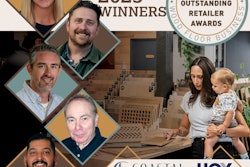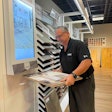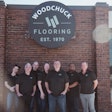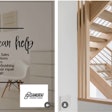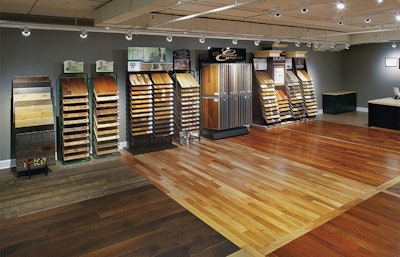
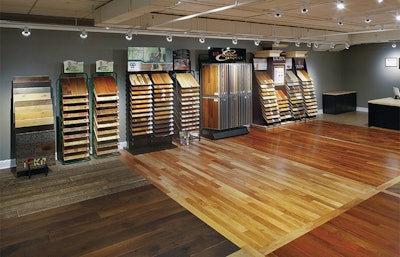
At a GlanceName: Unique Wood Floors |
HF's Andrew Averill spoke with Andrew Zheng of Unique Wood Floors, a retailer in Bloomington, Minn.:
What's your sales technique?
We're never trying to force anyone into making a sale right away or buying a floor that maybe they're not comfortable buying yet. We believe that once you know a product well enough, and you spend the time talking to people about the product you're selling, then the sale comes naturally. People get a sense that we're trying to help them.
How do you approach customers?
 Andrew Zheng - Sales and Internet marketing
Andrew Zheng - Sales and Internet marketing
Honestly, we haven't found it difficult at all to approach people. Most of the time, when customers walk in, within 15 to 20 seconds we say, "Hi," and introduce ourselves. After that, they usually engage in conversation right away. Being a wood flooring specialty store, we have a lot of things to talk about when it comes to wood floors.
What common questions do you get in the showroom?
One concern is if the floor will work with the customer's cabinetry, or if the color will be a good fit for the home. I like to find out the trim or baseboard color or the cabinet color and go from there. I like the colors to be a little bit contrasted. For example, if you go with a medium-color cabinetry, something like cherry, then I would shy away from a cherry floor. A lot of that is opinion-based, but I think that's why we're always trying to adapt to the different styles that come out each year.
How do you stay on top of the trends?
We try to go to all the trade shows—that's where we get a lot of our ideas—and we're fast to adapt. If you go to the more coastal cities, some of their trends are moving at a faster rate. You can almost guarantee that it's going to be popular in the Midwest fairly soon.
How does your trend insight benefit you?
We've heard it countless times—homeowners come in and they say, "We wish we would have found you earlier because you're the only store that has a bunch of these oil-finished floors," and that is exactly what we're looking for. We're also able to stock some of the flooring we see doing pretty well in the future and sort of get the best price advantage, which doesn't hurt either.
Do you educate the customer before they leave?
We try to get a brochure into their hands. It's basically like a little guide for each person who purchases flooring from us. It covers how, in Minnesota, in our region, you want to maintain moisture and make sure the flooring doesn't get too dry in the winter time. And using the right cleaners. It just basically gets them started on the right track. We want to avoid the situation where something went wrong and it's because the homeowner didn't take care of the floor. Ultimately it's the salesperson's responsibility to educate the consumer on those factors.
How do you deal with customer complaints?
A complaint is a good opportunity to make sure they are satisfied. Maybe one of our salespeople didn't explain something clearly and the product wasn't what they expected. For example, some floors naturally have more variation in the flooring itself. If the cost is reasonable, we usually give in to it, more or less, and give them a couple boxes of floors to make sure they're happy. Usually we find most people are fairly reasonable. If it's a problem after installation, we walk the customer through the inspection process.
What about negative online reviews?
With negative online reviews, it's generally a misunderstanding or sometimes it could just be slow response times. There could be a number of reasons why people are unhappy on that particular day. Basically we try to see if it's something we can fix, and if not, and if it's an honest opinion, we just let it be. You can't let it bother you too much. You just do what you feel is right.
How important is it to have a website?
Even if you don't plan on selling your flooring directly through your website, that's one of the main ways people are able to search for you is through your site. Let's say you type in to Google, "Minnesota wood flooring." We're usually one of the first ones to pop up. And that itself has brought us a lot of free traffic. People might not ever have found us if it weren't for Google. It's also important to have social media presence. It's the kind of marketing you can do on your own—set up a Facebook page, set up a Twitter account, a Houzz account. You can do it day-by-day.
Do you sell products through your website?
Yes, people can purchase directly from our site and we can ship to anywhere in the country. Basically, at the click of a button they get the floor in about a week or two. I think it's maybe about 30 percent of our business. A lot of consumers are still reluctant to purchase the flooring directly without any contact with a sales person. People love the "consultative" feel of an actual showroom. They can come in and talk to us if they have any questions about their project. We do process a lot of orders over the phone, as well. But I think the Internet is a growing market. It's good that we got in a little bit earlier.
















